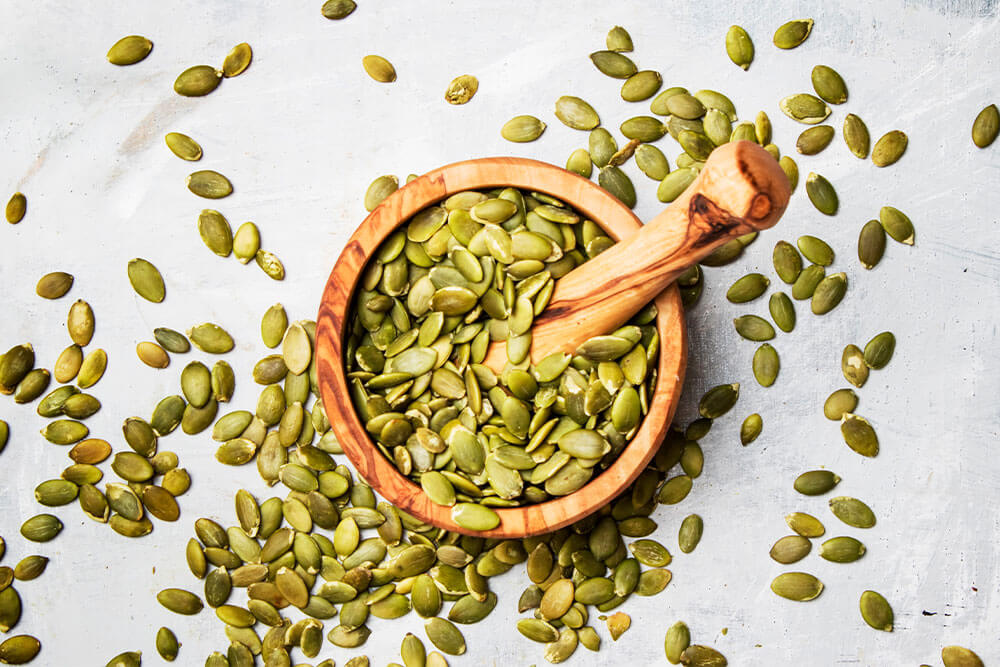Ingredient Spotlight: Seeds

Forget about nuts; let's talk about seeds for a second. It's undeniable that seeds are at the forefront of the food industry; after all, there would be no fruits or vegetables without them. However, the role of seeds has changed in recent years. They are becoming an ingredient of their own, backed by large demand from consumers in light of their health benefits and nutritional value. As the market for seeds continues to gain momentum, many CPG snack brands have started to formulate with them to get ahead of the curve. Want to know why? Here’s what you need to know about seeds.
What are seeds (as an ingredient)?
A seed is at its core is the first developmental stage of a plant. It contains all the starting materials necessary to develop into a fully-grown plant, making them extremely nutritious. They are rich in fiber, monounsaturated fats, polyunsaturated fats, as well as vitamins and antioxidants. They are known to help regulate blood sugar, blood pressure, and cholesterol amongst others.
Seeds are also low in carbs, high in protein, and low in sugar. As such, they are a great option for some of the hottest diets, such as keto, paleo, and MIND. A great alternative to nuts, think of seeds as your new best friend when it comes to formulating your innovative protein bar, cookie, and toaster pastry recipes. Currently, sunflower seeds, flaxseeds, chia seeds, hemp seeds, and sesame seeds are among the most popular picks on the market.
3 Reasons Why You Should Use Seeds Instead of Nuts
1. Non-Allergenic
There are many types of allergens in the food industry with nuts being the most prominent of them all. In fact, more than 3 million Americans are allergic and are not allowed to eat products with nuts in them. Because of this, many brands must be wary of their ingredients and go as far as to work with protein bar co-packers to add the necessary warnings on packaging. Seeds, on the other hand, are non-allergenic, which make them a perfect substitute for the nutritional value nuts bring to your delectable treat. Non-allergenic seeds include pumpkin seeds, sunflower seeds, flaxseeds, hemp seeds, and chia seeds.
Companies that incorporate seeds into their products will be able to widen their reach to capture the 3 million Americans allergic to nuts.
2. Rich in Healthy Fats, Vitamins, and Antioxidants
While seeds and nuts are very different ingredients, they do have a lot of similar health benefits. Like nuts, seeds are a great source of protein, minerals, healthy fats, vitamins, fiber, and bioactive plant compounds. However, not all seeds pack the same nutritional value; let’s take a closer look at some of the most popular seeds and what they bring to the table:
- Flaxseeds offer an outstanding source of plant-based omega-3s.
- Chia seeds offer a large amount of fiber, calcium, and plant-based omega-3 fatty acids.
- Hemp seeds offer a large amount of protein, magnesium, manganese, and plant-based omega-3 fatty acids.
- Pumpkin seeds are bursting with protein, fiber, iron, zinc, potassium, and magnesium.
- Sunflower seeds contain a large amount of vitamin E, folate, magnesium, and selenium.
- Sesame seeds are anti-inflammatory and antioxidant, as well as a source of calcium, iron, magnesium, and zinc.
Adding seeds in your treats allows consumers to indulge in their favorite snacks while getting all the nutrients they need. With this in mind, creating innovative snacks that incorporate functional ingredients, such as seeds, will stand out in a saturated market due to their impressive range of health benefits.

3. Less Expensive to Grow
Sourcing ingredients is always an important concern when it comes to planning and producing a new product because fact is that not all ingredients cost the same. Some are more costly than others, while some are more inexpensive than others. In this case, nuts are the more expensive option with seeds being the more affordable alternative.
Because seeds are meant to be produced in bulk, they are planted in large quantities at a time, making them much more inexpensive to germinate, grow, and cultivate compared to nuts. Nuts, on the other hand, are more akin to fruit than a seed; they do rely on a ripening period and their harvest is - as a result - longer and more specialized. This means that, on average, they are more expensive, and the more types of nuts you need, the larger the bill will be for you. Additionally, seeds are small in size and sold in larger quantities, meaning you'll be getting more product per purchase. This allows you to have a consistent, affordable, and abundant source of protein for your products. So, opting for seeds over nuts is definitely a reliable way to cut on costs and innovate while capitalizing on the growing seed market.
Key Takeaways
Seeds as an ingredient is a trend we expect to see grow in the upcoming years. To stay relevant, food visionaries must consider incorporating different types of seeds into their innovative snack capabilities.
Not sure how to formulate your snacks with seeds? You don't have to do it alone. Think about partnering with a co-manufacturer, like YouBar, who can help you take advantage of all the new and upcoming trends and equipment in the industry. Contact us today to learn how we help you bring your innovations to life.



